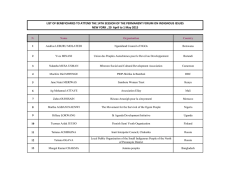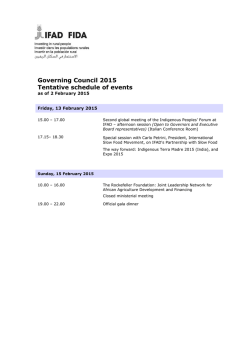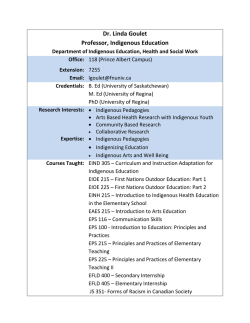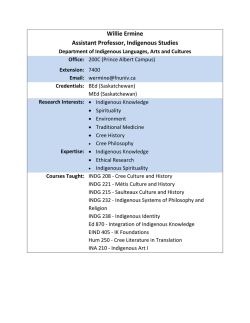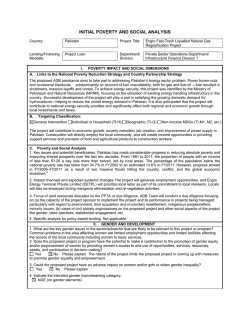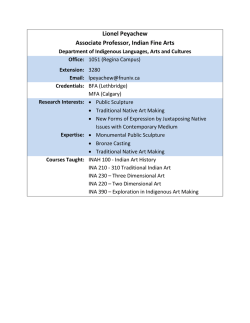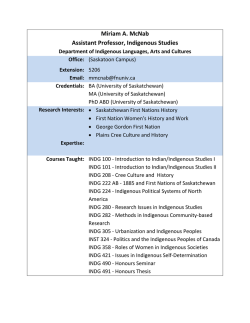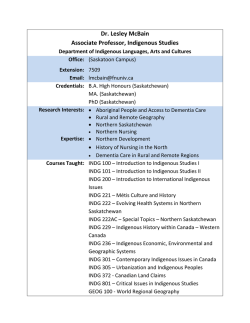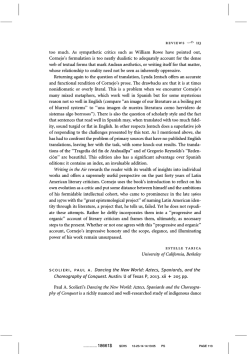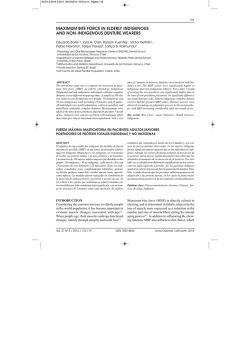
Concept Note - Panel on Indigenous Peoples
CONCEPT NOTE IFAD GOVERNING COUNCIL 2015 PANEL ON INDIGENOUS PEOPLES Indigenous Peoples and Sustainable Food Systems The panel will provide an opportunity to highlight: Rural heterogeneity as reflected by the distinctive social and cultural identities of indigenous peoples IFAD’s inclusive support for indigenous peoples working to transform local communities that otherwise would be left out of development planning A new development model that emerged in the context of the World Conference on Indigenous Peoples, with the potential to empower rural people and solve pressing global economic, social and environmental challenges. On the issue of sustainable food systems, the panel will discuss: Indigenous peoples’ distinctiveness as expressed in the diversity of their crops and their farming, herding, fishing and hunting/gathering systems, which produce nutritious food in the face of adverse climate conditions The importance of indigenous peoples' food, culture and agro-ecological systems to food and nutrition security, ecosystem and resource management, environmental health, sustainability and resilience – and as models for the green economy The need to recognize indigenous food systems as modern systems that are crucial for indigenous peoples' economic development and can make invaluable contributions to humanity’s future. The role of indigenous food systems in achieving the anticipated post-2015 sustainable development goals on food and nutrition security. Framing the discussion The discussion of these broader issues will be framed around the concept of "food gentrification" in which traditional crops and foods are adopted as "power foods" by consumers in industrialized countries, increasing their prices significantly. This phenomenon can be seen as either a benefit for indigenous smallholder farmers who are able to sell these crops for export at market, or a disadvantage for indigenous peoples who are themselves no longer able to afford former staple foods. As blogger Sami Grover puts it: “Just as the rehabilitation of derelict inner-city properties brings with it both the problems of gentrification and the promise of urban renewal, so too the idea of a global food trade raises the potential for both economic empowerment and further exploitation of marginalized communities.” Grover's piece on Mother Nature Network nicely sums up the controversy as it specifically applies to quinoa. See "Has the popularity of quinoa hurt the people who grow it?" The discussion will also touch on the question of whether indigenous peoples' food production can really have an impact on global food security, given that it takes place on a small scale relative to the increasing food demands of a rapidly growing world population. Panellists The panel will consist of four participants, plus a moderator. Prior to the panel discussion, the 80-minute programme will begin with a 15-minute centre-stage interview with Victoria Tauli-Corpuz, the UN Special Rapporteur on the Rights of Indigenous Peoples. Tauli-Corpuz belongs to the Kankanaey Igorot people of the Cordillera Region in the Philippines and is former chair of the UN Permanent Forum on Indigenous Issues. Following the interview, a relevant IFAD video will be screened, after which the panel will commence. The panellists will include: Mirna Cunningham, indigenous Miskita from Nicaragua, veteran indigenous rights activist, former chair of the UN Permanent Forum on Indigenous Issues and current President of the Center for Indigenous Peoples’ Autonomy and Development, Puerto Cabezas, Nicaragua. Adam Kuleit Ole Mwarabu Lemareka, Secretary of the Parakuiyo Community, a traditional council for the Parakuiyo Maasai people of Tanzania, and Coordinator Director of the Parakuiyo Pastoralists Indigenous Community Development Organization, which coordinates development and advocacy efforts involving Tanzanian pastoralists. Harriet V. Kuhnlein is Professor Emerita of Human Nutrition and the founding Director of the Centre for Indigenous Peoples’ Nutrition and Environment at McGill University in Montréal, Canada. Her research focuses on biodiversity in the traditional food resources of indigenous peoples. Rukka Sombolinggi, International Advocacy Coordinator of Aliansi Masyarakat Adat Nusantara, or AMAN, an organization of indigenous peoples in Indonesia which as of today has 1,025 indigenous communities and more than 30 indigenous organizations as members. She belongs to the Toraya People in central part of Sulawesi Island. Following their discussion, the panellists will be joined by Adolfo Brizzi, the Director of IFAD's Policy and Technical Advisory Division, which oversees technical support for country programmes, country policy dialogue and strategic partnerships. Brizzi will offer an IFAD perspective on issues raised by the indigenous peoples' representatives. Moderator Jane O’Brien is a regular host of BBC World News America. She has worked in TV, radio and print journalism for more than 25 years and is based in Washington DC. She has also been a media consultant for UNICEF, writing extensively for the fund's award winning web site, and narrating and producing video segments that highlight the work of UNICEF and other UN agencies. O'Brien moderated the IFAD "Untold Stories" newsmaker event on food and migration in Washington, DC last October. In addition to interviewing Tauli-Corpuz and moderating the panel discussion, O'Brien will field questions directly from the audience on-site and from viewers of the webcast via social media. Indigenous Peoples Forum synthesis of deliberations Following the panel, under the agenda item Business items for approval and for information, a representative from the Indigenous Peoples Forum at IFAD will present the Forum's synthesis of deliberations to the Governing Council. 2
© Copyright 2026
